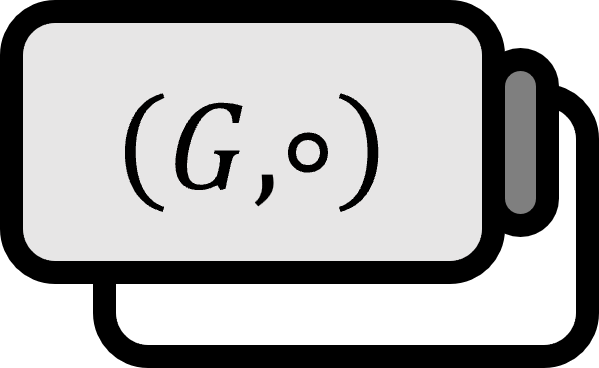Proof of the Third Isomorphism Theorem
Theorem 1
Let $G,G'$ be a group.
- First Isomorphism Theorem: If there exists a homomorphism $\phi : G \to G'$ then $$ G / \ker ( \phi ) \simeq \phi (G) $$
- Second Isomorphism Theorem: If $H \le G$ and $N \triangleleft G$ then $$ (HN) / N \simeq H / (H \cap N) $$
- Third Isomorphism Theorem: If $H , K \triangleleft G$ and $K \leq H$ then $$ G/H \simeq (G/K) / (H/K) $$
The Isomorphism Theorem refers to these three independent theorems proven by the algebraist Emmy Noether.
- $\ker$ is the kernel.
- $N \triangleleft G$ implies that $N$ is a normal subgroup of $G$.
Description
The Isomorphism Theorem, proven by the algebraist Emmy Noether, refers to these three independent theorems. Modifying the representation of the quotient group in the Third Isomorphism Theorem slightly gives $$ {{G} \over {H}} \simeq {{ {{G} \over {K}} } \over { {{H} \over {K}} }} $$ This is similar to multiplying both numerator and denominator by $\displaystyle {{1} \over {K}}$.
Proof
The proof of the Second Isomorphism Theorem is almost identical, differing only in the definition of $\phi$ and showing that $H$ is the kernel. Let’s define $\phi : G \to (G/K) / (H/K)$ as $\phi (g) = gK (H / K)$.
After showing that $\phi$ is a canonical mapping and that $H$ is $\ker \phi$, using the First Isomorphism Theorem completes the proof.
Part 1. $\phi$ is a function.
For $x,y \in G$ $$ \begin{align*} x &= y \\ \implies& x K (H / K) = y K (H / K) \\ \implies& \phi (x) = \phi (y) \end{align*} $$ thus, $\phi$ is a function.
Part 2. $\phi$ is a homomorphism.
For $x,y \in G$ $$ \begin{align*} \phi ( xy ) =& (xyK) ( H / K) \\ =& [ ( x K ) ( y K) ] ( H / K) \\ =& [ ( x K ) (H / K)] [ ( y K ) (H / K) ] \\ =& \phi ( x ) \phi ( y ) \end{align*} $$ thus, $\phi$ is a homomorphism.
Part 3. $\phi$ is surjective.
For every $gK (H / N) \in (G / K) / (H / K )$ $$ \phi ( g ) = g K ( H / K ) $$ there exists some $g \in G$ satisfying this, so $\phi$ is surjective.
Part 4. $H = \ker ( \phi )$
If $( \subset )$ $h \in H$ then $\phi (h) = h K ( H / K ) = K ( H / K )$ hence $$ h \in \ker ( \phi ) $$
If $( \supset )$ $h \in \ker ( \phi)$ then from $\phi (h) = K ( H / K ) = hK (H / K )$ $hK = K \in ( H / K )$ hence $$ h \in H $$
Part 5.
First Isomorphism Theorem: If homomorphism $\phi : G \to G'$ exists, then $G / \ker ( \phi ) \simeq \phi (G)$
Since $\phi : G \to (G/K) / (H/K)$ is a homomorphism and surjective $$ \phi ( G ) = (G/K) / (H/K) $$ Meanwhile, because of $H = \ker ( \phi )$, by the First Isomorphism Theorem, the following holds. $$ G/H \simeq (G/K) / (H/K) $$
■
Fraleigh. (2003). A first course in abstract algebra(7th Edition): p307~309. ↩︎
